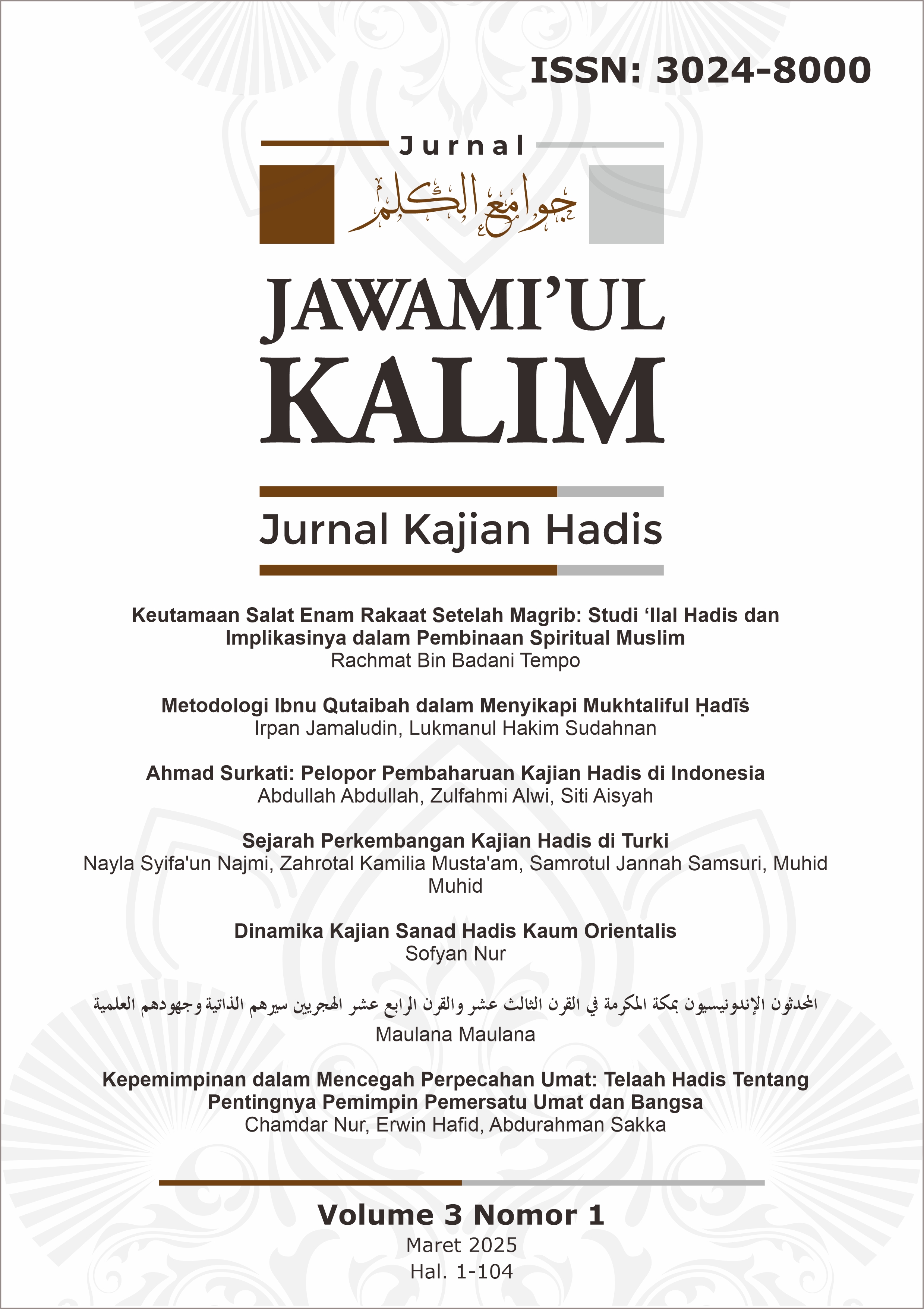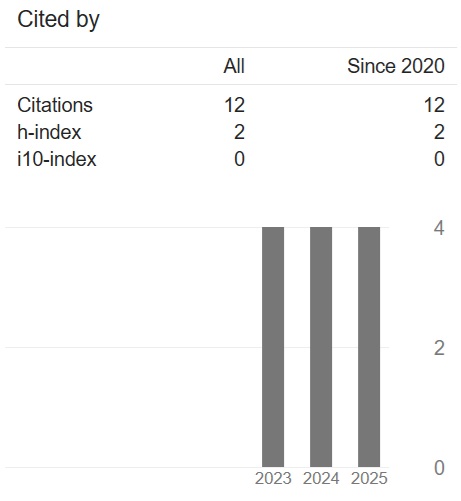Keutamaan Salat Enam Rakaat Setelah Magrib: Studi ‘Ilal Hadis dan Implikasinya dalam Pembinaan Spiritual Muslim
The Virtue of Praying Six Rakaats After Maghrib: A Study of ‘Ilal Hadith and Its Implications in the Spiritual Development of Muslims
DOI:
https://doi.org/10.36701/jawamiulkalim.v3i1.2117Keywords:
Six Rakat, Twelve Years, ‘Ilal al-Hadith, Spiritual FormationAbstract
The hadith that mentions the virtue of praying six rakaat after Maghrib, with the promise of a reward equivalent to twelve years of worship, is one of the hadiths that is often quoted in order to motivate Muslims to increase sunnah worship. Although this hadith is widely known, it is important to trace its validity based on scientific studies of the hadith, both in terms of sanad and matan. This study aims to examine the status of the hadith in depth using the ‘ilal al-hadith approach, and to link it to the relevance of Islamic teachings regarding sunnah deeds and spiritual development. This study uses a qualitative method through a literature study of classical and contemporary hadith literature. Based on the results of the study, this hadith is categorized as a weak hadith because in its sanad there are several narrators who are considered weak by hadith experts. However, some scholars allow the practice of weak hadith in the context of fadha'il al-a'mal (the virtue of deeds) with certain conditions. The content of this hadith has high motivational value within the framework of tazkiyah an-nafs, namely the purification of the soul, and can be part of an Islamic development strategy in everyday life. Thus, this hadith can still play a role in forming a strong culture of worship among Muslims.
References
Al-Qur’an al-Karim
Al-‘Asqalānī, Aḥmad bin ‘Ali bin Hajr. Lisān al-Mīzān. Cet. I; Dar al-Bisyarah al-Islamiyyah, 2002 M.
Al-‘Asqalānī, Aḥmad bin ‘Ali bin Hajr. Tahzīb al-Tahzīb. Cet. I; India: Matba’ah Dairah al-Ma’arif, 1326 H.
Al-‘Asqalānī, Aḥmad bin ‘Ali bin Hajr. Taqrīb al-Tahzīb. Cet. I; Suriah: Dar al-Rasyid, 1406 H.
Al-‘Irāqī, ‘Abdul Rahīm bin Ḥusaīn. Al-Mugnī ‘An Ḥaml al-Asfār Fī al-Asfār. Cet. I; Beirut: Dar Ibn Hazm, 1426 H.
Al-Albani, Nasiruddin. Irwā al-Ghalīl. Cet. II; Beirut: al-Maktab al-Islamy, 1405 H.
Al-Asbahānī, Aḥmad bin ‘Abdullāh bin Aḥmad. Al-Dhu’afa. Cet. I; Dar al-Baidha: Dar al-Tsaqafah, 1405 H.
Al-Bukhārī, Muḥammad bin Ismā’īl. Sahīh al-Bukhārī. Cet. I; Dar Thauq al-Najah, 1422 H.
Al-Bustī, Muḥammad bin Hibbān. Al-Majrūhīn. Cet. I; Halb: Dar al-Wa’y, 1396 H.
Al-Hanafī, Ḥasan bin ‘Ammār. Marāqi al-Falāh. Cet. I; Mesir: Maktabah al-Mashriyyah, 1425 H.
Ibn Abī Syaibah Abū Bakr. Al-Mushannaf. Cet. I; Riyadh: Maktabah al-Rusyd, 1409 H.
Ibn al-Asy’ats, Abū Dāwud Sulaimān. Sunan Abū Dāwud. Cet. I; Dar al-Risalah al-‘Alamiyyah, 1430 H.
Ibn al-Atsīr, Al-Mubārak bin Muḥammad. Jāmi’ al-Ushūl. Cet. I; Dar al-Kutub al-‘Ilmiyyah, 1391 H.
Ibn Jauzī, ‘Abdurrahmān bin ‘Ali. Al-Dhu’afa Wa al-Matrūkīn. Cet. I; Beirut: Dar al-Kutub al-‘Ilmiyyah, 1406 H.
Ibn Sālim, Aḥmad bin Gānim. Al-Fawākih al-Dawānī. Dar al-Fikr, 1415 H.
Ibn Sālim, Ibrāhīm bin Muḥammad. Manār al-Sabīl Fī Syarh al-Dalīl. Cet. 7: Al-Maktab al-Islamy, 1409 H.
Al-Jurjānī, Abū Aḥmad bin ‘Adi. Al-Kāmil Fī Dhu’afa al-Rijāl. Cet. I; Beirut: Al-Kutub al-‘Ilmiyyah, 1418 H.
Kementerian Agama RI, Al-Qur’an dan Terjemahannya. Bandung: Cordoba, 2021.
Al-Mausilī, Aḥmad bin ‘Ali Abū Ya’la. Musnad Abū Ya’la. Cet. I; Damaskus: Dar al-Ma’mun Li al-Turas, 1404 H.
Al-Mawardī, ‘Ali bin Muḥammad. Al-Hāwi al-Kabīr. Cet. I; Beirut: Dar al-Kutub al-‘Ilmiyyah, 1429 H.
Al-Mubārakfūrī, Muḥammad ‘Abdurraḥmān bin ‘Abdurraḥīm. Tuḥfah al-Aḥwazī. Beirut: Dar al-Kutub al-‘Ilmiyyah.
Al-Naisabūrī, Muslim bin al-Ḥajjāj. Sahīh Muslim. Beirut: Dar Ihya Turats al-‘Arabi.
Al-Qazwainī, Muḥammad bin Yazīd. Sunan Ibn Mājah. Cet. I; Dar al-Risalah al-‘Alamiyah, 1430 H.
Al-Shan’ānī, Muḥammad bin Ismā’īl. Al-Tanwīr Syaraḥ al-Jāmi’ al-Shagīr. Cet. I; Riyadh: Maktabah Dar al-Salam, 1432 H.
Al-Tabarānī, Sulaimān bin Aḥmad bin Ayyūb. Al-Mu’jam al-Awsat. Kairo: Dar al-Haramain, 1415 H.
Al-Thībī, Al-Ḥusain bin ‘Abdullāh. Al-Kāsyif ‘An Haqāiq al-Sunan. Cet. I; Riyadh: Maktabah Nizar Musthafa al-Baz, 1417 H.
Al-Tirmiżī, Muḥammad bin ‘Īsa bin Saurah. Sunan al-Tirmiżī. Cet. II; Mesir: Matba’ah Mustafa al-Baby, 1395 H.
Al-Ẓahabī, Muḥammad bin Aḥmad. Tahzīb al-Kamāl Fī Asmā al-Rijāl. Cet. I; Beirut: Muassasah al-Risalah, 1400 H.











